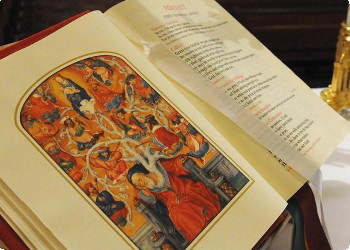With your own words I shall condemn you, you wicked servant
20 NOVEMBER (Lk 19,11-28)
The word of man is man himself. Everyone is his word. Even in this man is in the image of God. In God word and essence coincide. Never might God say a word that is not most pure truth, charity, justice and holiness. Man also will always have a word according to his nature. The word is good, if its nature is good. On the contrary, it is a bad word, if the nature is bad. God judges us according to our words. Ancient Scripture is a witness. David puts a man to death for his word.
After the death of Saul, David returned from his defeat of the Amalekites and spent two days in Ziklag. On the third day a man came from Saul’s camp, with his clothes torn and dirt on his head. Going to David, he fell to the ground in homage. David asked him, “Where do you come from?” He replied, “I have escaped from the Israelite camp.” “Tell me what happened,” David bade him. He answered that the soldiers had fled the battle and that many of them had fallen and were dead, among them Saul and his son Jonathan. Then David said to the youth who was reporting to him, “How do you know that Saul and his son Jonathan are dead?” The youthful informant replied: “It was by chance that I found myself on Mount Gilboa and saw Saul leaning on his spear, with chariots and horsemen closing in on him. He turned around and, seeing me, called me to him. When I said, ‘Here I am,’ he asked me, ‘Who are you?’ and I replied, ‘An Amalekite.’ Then he said to me, ‘Stand up to me, please, and finish me off, for I am in great suffering, yet fully alive.’ So I stood up to him and dispatched him, for I knew that he could not survive his wound. I removed the crown from his head and the armlet from his arm and brought them here to my lord.” David seized his garments and rent them, and all the men who were with him did likewise. They mourned and wept and fasted until evening for Saul and his son Jonathan, and for the soldiers of the Lord of the clans of Israel, because they had fallen by the sword. Then David said to the young man who had brought him the information, “Where are you from?” He replied, “I am the son of an Amalekite immigrant.” David said to him, “How is it that you were not afraid to put forth your hand to desecrate the Lord’s anointed?” David then called one of the attendants and said to him, “Come, strike him down”; and the youth struck him a mortal blow. Meanwhile David said to him, “You are responsible for your own death, for you testified against yourself when you said, ‘I dispatched the Lord’s anointed.'” (2Sam 1,1-16).
The wicked servant is condemned for his science, his conscience and his nature.
While they were listening to him speak, he proceeded to tell a parable because he was near Jerusalem and they thought that the kingdom of God would appear there immediately. So he said, “A nobleman went off to a distant country to obtain the kingship for himself and then to return. He called ten of his servants and gave them ten gold coins and told them, ‘Engage in trade with these until I return.’ His fellow citizens, however, despised him and sent a delegation after him to announce, ‘We do not want this man to be our king.’ But when he returned after obtaining the kingship, he had the servants called, to whom he had given the money, to learn what they had gained by trading. The first came forward and said, ‘Sir, your gold coin has earned ten additional ones.’ He replied, ‘Well done, good servant! You have been faithful in this very small matter; take charge of ten cities.’ Then the second came and reported, ‘Your gold coin, sir, has earned five more.’ And to this servant too he said, ‘You, take charge of five cities.’ Then the other servant came and said, ‘Sir, here is your gold coin; I kept it stored away in a handkerchief, for I was afraid of you, because you are a demanding person; you take up what you did not lay down and you harvest what you did not plant.’ He said to him, ‘With your own words I shall condemn you, you wicked servant. You knew I was a demanding person, taking up what I did not lay down and harvesting what I did not plant; why did you not put my money in a bank? Then on my return I would have collected it with interest.’ And to those standing by he said, ‘Take the gold coin from him and give it to the servant who has ten.’ But they said to him, ‘Sir, he has ten gold coins.’ ‘I tell you, to everyone who has, more will be given, but from the one who has not, even what he has will be taken away. Now as for those enemies of mine who did not want me as their king, bring them here and slay them before me.'” After he had said this, he proceeded on his journey up to Jerusalem.
The evil nature of this servant makes him utter evil words. The evil nature justifies with its words his having been lazy, slothful, careless and irresponsible. He is justly condemned. His nature requires it.
Virgin Mary, Mother of the Redemption, Angels and Saints make us with a good and right nature.





